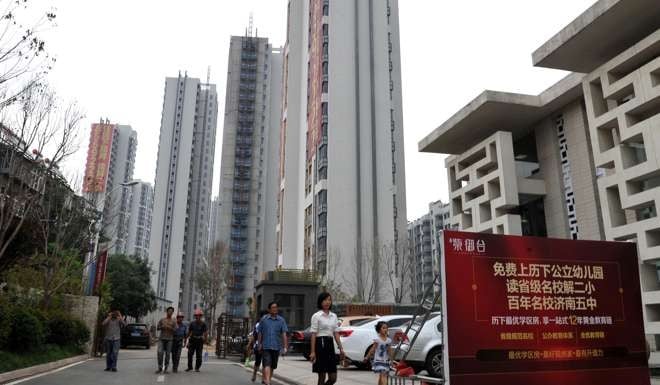Most Chinese cities shrug off property cooling measures during holiday week
Jinan, Nanchang, Nanning and Guangzhou are among cities where sales defied new policies aimed at curbing home buyers’ enthusiasm

A flurry of fresh tightening policies during the National Day holiday period has so far failed to dampen home buyers’ enthusiasm in most Chinese cities, as looser credit conditions and a dearth of high-yielding assets remain.
The property markets in many second-tier cities defied the new wave of curbing measures, and in some cases even saw prices surge, according to their turnover data in the first week of October. However, home sales in a few cities that had rolled out stronger curbing measures at an earlier stage, have fallen sharply. These include Beijing, Shanghai, Xiamen and Nanjing.
A property fever has gripped the mainland market since the second half of 2015, doubling home prices in many cities and prompting municipal governments across China to impose the most intensive market curbs since 2011. Starting with Beijing on the eve of National Day, more than 10 cities imposed restrictive measures ranging from raising down-payment requirements to barring non-local buyers in the space of a week.
Including those that had already introduced cooling measures, a total of 21 cities now have buying restrictions in place, a drastic increase from just a month ago when just eight cities had them.
However, there is no clear sign of dented fervour in many second-tier cities, at least for now.
In Jinan, Nanchang, Nanning and Guangzhou, all of which have imposed tightening measures, property sales during the first seven days of October surged by between 170 per cent and 454 per cent compared with the same period a year ago, according to China Real Estate Information Corporation(CRIC).

That’s not the case for Beijing, Shanghai, Xiamen and Nanjing, where restrictions were in place before October and were recently strengthened by additional measures. Sales in Xiamen, a city which had previously seen its home prices soar, experienced a sales decline of 85 per cent during the holiday period. In Nanjing, sale fell 40 per cent.
Daily average turnover in Beijing fell sharply from 1,066 units the week before October 1 to 291 units in the first six days of the month, according to municipal data. Only 209 pre-owned homes were sold, the lowest number for the past five years. Shanghai, which announced its widely anticipated new curbs on October 8, saw its sales fall 39 per cent.
Prices of pre-owned homes in Beijing, Suzhou and Tianjin were becoming more flexible after a period of swift gains during which buyers had little room to negotiate, according to local media reports.
Analysts said sales data for the one-week period was of limited use, and figures for the whole of October and November would show whether the latest measures to rein in the red-hot property market have been effective or not. However, most agreed that measures such as raising the down payment ratio is effective in deterring speculative buyers.
“A major difference of this round of tightening, compared to the last round in 2011, is that the authorities have protected first-time buyers, who can still buy homes at a low down payment requirement. For non-local, multi-time home buyers, the down payment is raised significantly,” said Si Zhi, vice president of Soufun Holding.
He said the new policies are bound to tame price escalation in Beijing and other hotspot cities, and predicted a long period of frozen prices.
Yang Kewei, an analyst with CRIC, said sales in most cities would slump in the remainder of the year but prices are unlikely to budge. Home prices in some rich second-tier cities, such as Nanjing and Suzhou, would continue to rise, albeit at a slower pace, even if sales there plunge.
“As long as credit policy remains loose, demand is there, because money has nowhere else to go. The question is just how long will it be before the temporarily depressed demand bursts,” Yang said.